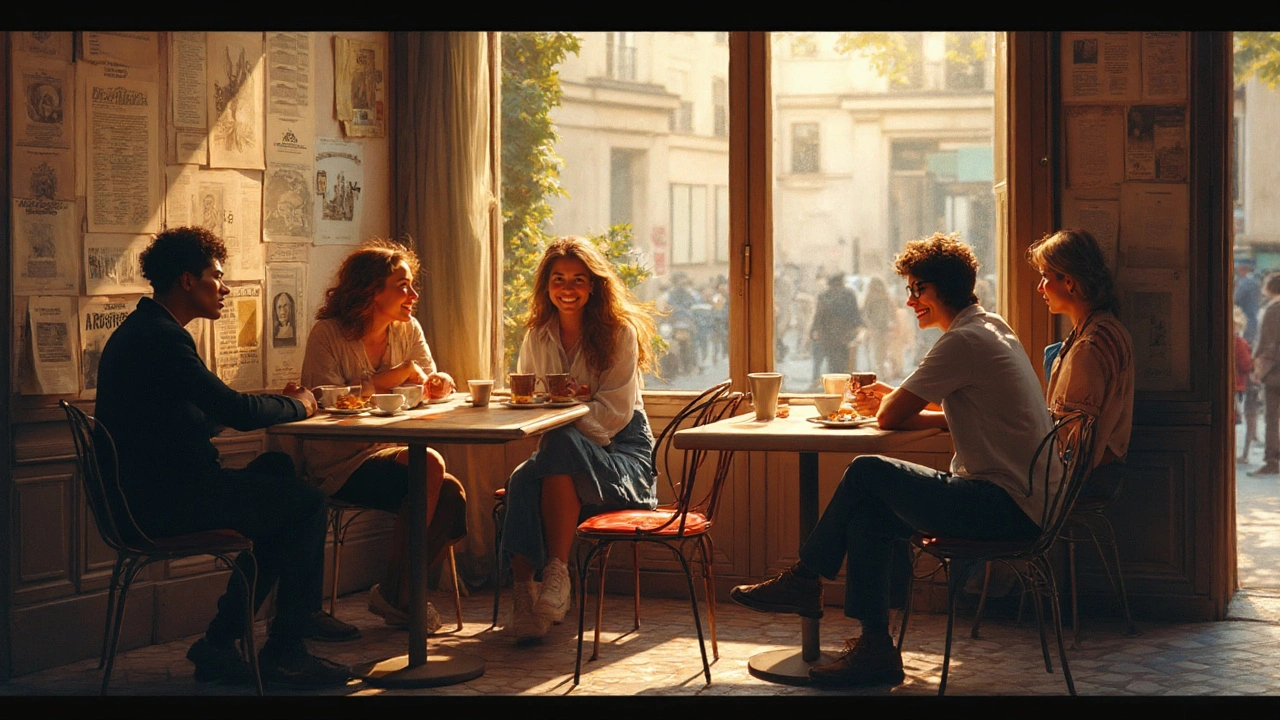You learn a lot about love and desire just by sitting at a terrasse in Paris for an hour. That couple on the corner? Married 20 years, still holding hands. The young woman kissing her partner with full abandon? Fresh romance written all over their faces. And somewhere nearby, an older gentleman flirts with a sparkling-eyed friend over glasses of Sancerre. It’s a dance that’s always changing—by the decade, by the arrondissement, sometimes by the season. In the City of Light, sexuality doesn’t freeze at adulthood. It shifts, evolves, gains layers. When it comes to French views on intimacy, there’s a freedom and finesse that can surprise even Parisians themselves.
Paris and the Culture of Sexual Evolution
Here’s something many outsiders get wrong: Paris isn’t just about wild nights in the Marais or sultry jazz bars along the Seine. That’s part of the lore, sure, but the city’s relationship with sexuality runs deeper. In Paris, open conversation about love and sex starts young—sometimes too young, if you ask certain parents navigating questions from their collège-aged kids. French culture famously champions la liberté, not just as revolutionary rhetoric but as the freedom to pursue pleasure and self-discovery at every age. Walk through the Parc des Buttes-Chaumont on a sunny day. You’ll spot gaggles of teenagers whispering on benches, elderly neighbors chatting intimately, and every shade of couple in between. Sexuality in Paris is woven into the daily fabric.
The French, especially Parisians, have a reputation for sophistication and openness, but it’s more nuanced than that. Surveys from Institut Français d’Opinion Publique show that over 84% of Parisians believe sexuality changes with age—a number higher than the national average. Part of this is city life itself: more opportunities, more diversity, more ways to express one’s identity. It’s not all open relationships and rooftop parties, though. Parisian attitudes sometimes clash with the deeper traditions found in smaller towns—think of old-school Catholic grandmothers from the 17th or rural Normandie weekends. But in Paris, conversation about sexuality is as likely to happen over lunch at a neighborhood bistro as it is at a doctor’s office. Resources like the planning familial centres or associations such as SOS Homophobie have offices dotted across Paris, making sexual wellness and support accessible regardless of background or orientation.
If you’re raising kids here like I am, the education comes at you fast. The Paris school system, influenced by national reforms, includes sexual health education as early as primaire, often prompting interesting dinner table questions. You get used to hearing vocabulary that might make an American blush—words like "plaisir" and "désir" are treated as normal, not taboo. This early exposure is part of why adults in Paris approach intimacy with curiosity rather than shame. It’s not about being jaded; it’s about knowing love doesn’t look or feel the same at 18, 35, or 67.
Changing Relationships and Desire Through Life
It’s a cliché, but it’s true: desire changes. Passion doesn’t disappear, but it rarely sits still. Among Parisians aged 25 to 35, apps like Happn (which was invented right here, by the way) make flirting and experimentation easier than ever. This isn’t just about casual hookups, despite the international reputation. It’s often about finding connection—a night of dancing at Rosa Bonheur, a conversation that stretches past midnight along the Canal Saint-Martin. In a city obsessed with taste and tiny details, the approach to sex is less about frequency and more about quality of connection.
Midlife brings its own surprises. Ask couples celebrating their tin or silver wedding anniversaries with a dinner at Le Train Bleu or Montmartre’s cozy bistros. Many will say that sexuality becomes more nuanced—less about racing to ecstasy and more about savoring the emotional bond. It’s helped along by a thriving local wellness sector. Boutiques selling high-end lingerie, like Chantal Thomass or Aubade on Boulevard Haussmann, market not just garments, but confidence and self-love. Even adult boutique chains like Passage du Désir make exploring pleasure both tasteful and fun, banishing old-school embarrassment. Doctors in large Parisian hospitals (think Hôpital Saint-Louis or Cochin) increasingly include sexual health in routine care, urging patients to see it as part of overall well-being, not something secret or shameful.
Later in life, the conversation shifts again. For many Parisians in their 60s and 70s, intimacy takes on subtler, sometimes richer forms. Paris’s cinemas and museums—like Le Louxor or the Musée d’Orsay—host panels and film nights about aging and love, attended by a surprisingly keen audience. Biological changes (hello, menopause and andropause) spark new questions, with university hospitals running workshops and support groups to awkwardly but honestly hash things out. Local pharmacies in almost every arrondissement, armed with both discreet advice and helpful products, make it clear: there’s no expiry date on desire.

The Role of Conversation, Art, and Parisian Daily Life
No other city quite mixes the ordinary with the extraordinary like Paris. Sex isn’t hidden behind closed doors, but neither is it carelessly flaunted. Look at the city’s art: erotic sculptures tucked away at the Musée Rodin, sensual photography exhibitions at La Maison Européenne de la Photographie, novels from Colette sold at cherished librairies in Saint-Germain. Even the language of everyday life—flirtatious quips on metro platforms or knowing winks between neighbors—reflects this playfulness. These public reminders nudge Parisians to see intimacy as both deliciously private and beautifully common.
Conversations matter here. Over a glass of Bordeaux at L'Avant Comptoir, people debate everything—from the latest piece in Le Monde about polyamory to whether an open relationship really "works." It isn’t unusual for friends to discuss boundaries and fantasies over dinner, sometimes with partners, sometimes solo. In Paris, therapy isn’t a taboo thing; seeing a sexologue (a sex therapist) is as normal as making a dentist appointment. Private practices have flourished in the 6th and 11th arrondissements, and many offer sliding scales so the service isn’t just for the elite.
The city’s events calendar plays a part, too. Each spring, the Salon de la Littérature Érotique draws artists, writers, and readers into thoughtful, sometimes steamy conversations about changing sexual mores. There are LGBTQ Pride festivities, the Marché du Désir pop-up celebrating sensual design, and seminars at Sciences Po discussing consent culture. It all keeps the discussion vibrant and pushes people to examine how sexuality evolves—not just for themselves, but for their community.
Practical Tips for Navigating Sexuality Across the Parisian Lifespan
When it comes to actually living out these evolving cycles of intimacy, Parisians draw on their unique mix of pragmatism and play. Here’s what actually works—a little advice from the city that knows love inside and out:
- Use the city’s network of sexual health centers, like the Centres de Santé Sexuelle, for confidential info and support. You’ll find them in nearly every arrondissement, from La Villette to Saint-Germain.
- Prioritize communication. Paris has the best conversation culture in the world; use it. Don’t shy away from talking about desires and boundaries, whether you’ve been together two months or twenty years.
- Explore local wellness services. Many spas, like Les Bains du Marais, now offer couples’ rituals focusing on connection and intimacy. It’s about time together, not just physicality.
- Make use of Paris’s rich arts scene. Pick a film at Le Champo or a play at Théâtre du Rond-Point that explores sexuality—then talk about it after. Art creates a safe space to voice thoughts you might not otherwise share.
- Remember self-love isn’t selfish. Businesses like Le Passage du Désir or premium lingerie ateliers (Simone Pérèle, anyone?) normalize both treating yourself and focusing on your own comfort with your body, regardless of age.
- Stay open to counseling. Speaking with a local sexologue, especially one who understands the city’s cultural quirks, can transform stuck patterns at any stage of life.
- Educate yourself and your kids. Don’t rely on the school system alone—pick up age-appropriate books at Librairie Gallimard, or check out short videos from associations like Le Planning Familial.
- For expats or newcomers, step into local conversations. There are meetups for every orientation, interest, and stage of life—try Meetup groups based in Montparnasse, or sign up for workshops at Centre LGBT Paris-Île-de-France.
Paris isn’t perfect, and the way Parisians approach sexuality isn’t a universal blueprint. Still, that local blend of honesty, artistry, and everyday acceptance offers real tools for anyone looking to understand how sexuality shifts over a lifetime. There’s wisdom in spending an afternoon beneath the chestnut trees at Jardin du Luxembourg, people-watching and remembering that every pair of lovers, new or weathered, shapes their own version of the story. And the sexuality in Paris? It never really stops changing—it learns, it adapts, and, yes, it keeps the city’s famous heart beating a little faster.

